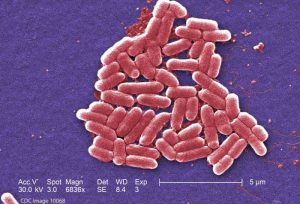Researchers at Kansas State University are creating better ways to detect E. coli to improve the cattle industry and protect consumers. Lane Noll, master’s student in veterinary biomedical science, Dr. T.G. Nagaraja, and Jianfa Bai are leading the project. A USDA Coordinated Agriculture Project grant is funding the research.
 Noll has developed a molecular assay that can “detect and quantify major genes specific for E. coli O157. He said in a statement, “developing a method to detect E. coli before it can potentially contaminate the food supply benefits the beef industry by preventing costly recalls but also benefits the consumer by ensuring the safety of the beef supply.”
Noll has developed a molecular assay that can “detect and quantify major genes specific for E. coli O157. He said in a statement, “developing a method to detect E. coli before it can potentially contaminate the food supply benefits the beef industry by preventing costly recalls but also benefits the consumer by ensuring the safety of the beef supply.”
The test finds the bacteria through “fingerprints”, or genetic sequences, that are unique to that organism. The test is quick and much less labor-intensive than existing methods. It targets four specific genes.
E. coli O157 in beef has been the cause of several outbreaks in the past few years. A current ongoing E. coli outbreak has sickened at least 11 people in four states and triggered a 900 ton recall of restaurant ground beef produced by Wolverine. Another outbreak in 2013 linked to ground beef served at the Coco Loco restaurant in College Station, Texas sickened at least five people. The huge XL Foods beef recall was linked to an E. coli outbreak in Canada that sickened at least 18 people. And in January 2013, an E. coli outbreak linked to raw ground beef sickened several people in Wisconsin.
Those are just the outbreaks that are publicized. Many people get sick from improperly handled and undercooked ground beef every year in the U.S. and around the world. To protect yourself, never serve undercooked ground beef, hamburgers, or other ground meat. Be careful about cross-contamination, and always wash hands, utensils, and work surfaces with soapy water after they come into contact with raw meat.




